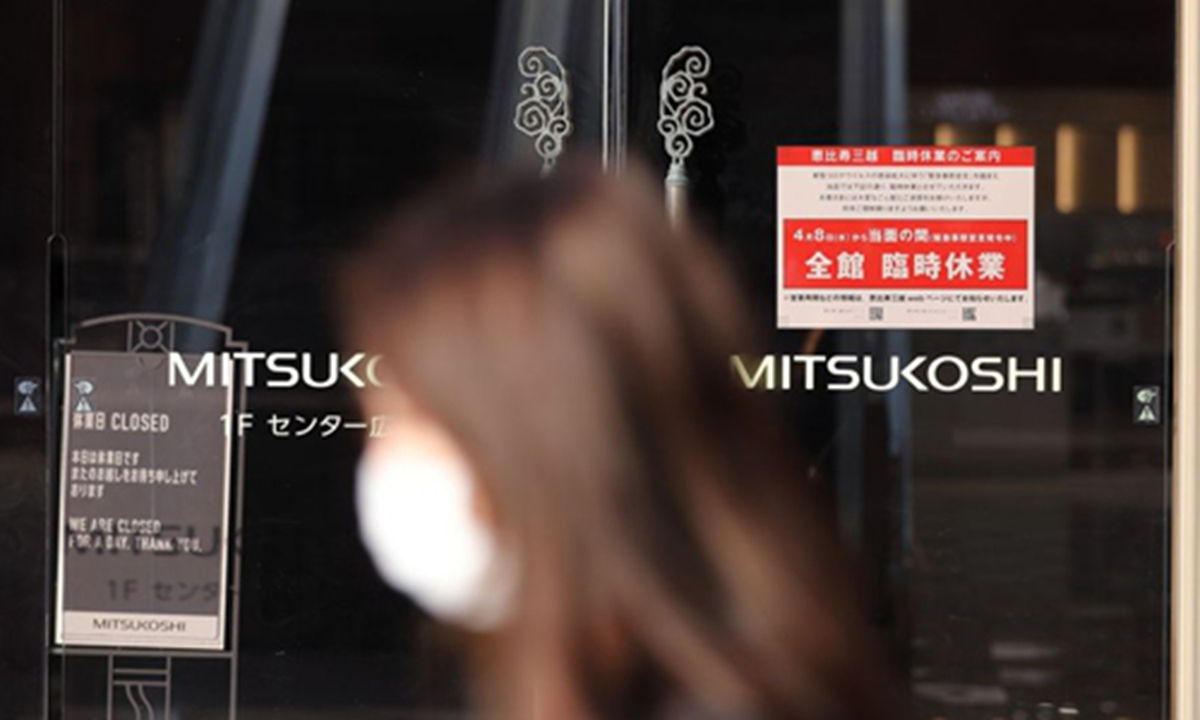Japan’s economy also needs a health check-up
Source: Global Times Published: 2020/8/17 20:14:30

A woman wearing mask passes a closed department store in Tokyo. Photo: Xinhua
Japanese Prime Minister Shinzo Abe reportedly entered hospital on Monday. While Kyodo News said the visit was for a regular health check-up, the news nevertheless fueled speculation about the prime minister's health.Such attention, to a certain extent, may also reflect the nation's anxiety over the enormous economic pressure mounting in Japan, and comes as a top official expressed concerns this weekend that Abe may be suffering from fatigue because of the heavy workload during the pandemic.
The Japanese economy is indeed in the midst of an extraordinary crisis as a result of the coronavirus pandemic. Official statistics revealed on Monday that Japan's GDP contracted by an annualized 27.8 percent, marking the third straight quarter of decline and the country's sharpest economic slump since comparable data became available in 1980.
It is true that the Japanese government has adopted massive stimulus measures to cushion the blow of the epidemic on the economy, but conventional policy tools are no longer sufficient to lift Japan out of its current mire.
At a time when the domestic economy is unable to recover on its own, Japan clearly needs to be more aggressive in seeking external cooperation, including but not limited to actively promoting free trade and accelerating regional economic development in Asia.
Japan has played a relatively fixed and mature role in the Asian industrial chain for a long time, but the pandemic has brought dramatic changes to the region's industrial structure. As its economy risks falling into a deeper recession, it is essential for Japanese industries to get out of their comfort zones, and for policymakers to decide which direction future policy is headed in before making economic development plans.
Given the stability of Sino-Japanese relations and China's post-coronavirus economic recovery, it is conceivable that finding ways to deepen economic and trade cooperation with China will be high on Japan's agenda. It is worth noting that bilateral economic ties between the two countries has been warming substantially against a backdrop of political stability. Despite the pandemic, the two countries' bilateral trade in the first half of 2020 still neared $150 billion, with about $2 billion of Japanese investment in China, essentially reaching the same levels as the same period last year, and underlining the resilience of the economic cooperation.
Of course, there is no denying that Japan's political wisdom will be stress-tested by the recent strain on US-China relations. But this is why Japanese politicians must see the need for independent thinking more than ever, rather than subordinating Japan to the US, which will only bring unpredictable downside risks to Sino-Japanese relations.
In this sense, its economy could use a health-check up as well, so that Japanese policymakers can recognize the status quo and thus explore the potential of bilateral relations more boldly and aggressively to find new growth points for economic cooperation with China.
Posted in: GT VOICE